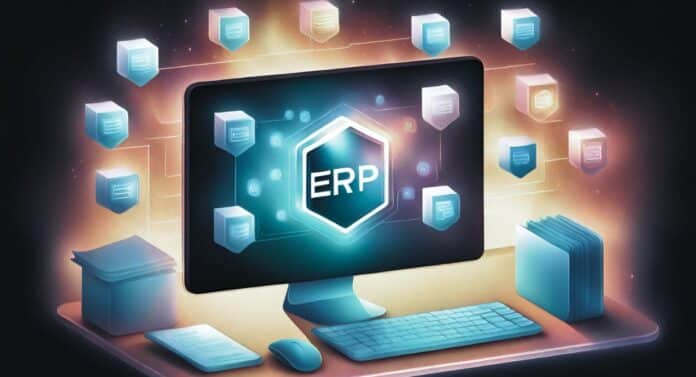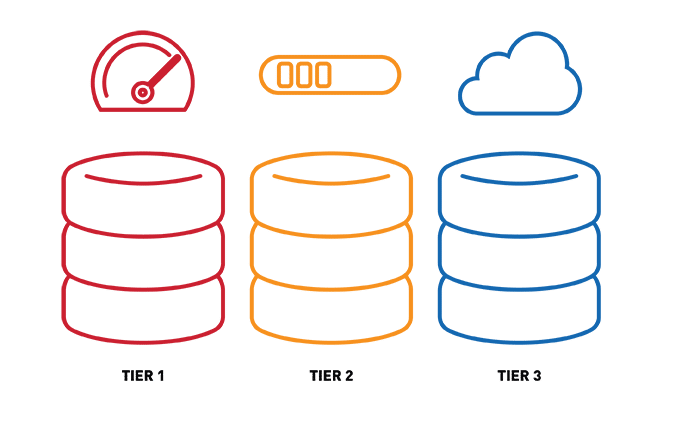In the world of business, especially in Singapore, ERP plays a vital role in assisting companies to automate and integrate their business processes.
In essence, ERP (Enterprise Resource Planning) is an integrated information system or software model capable of efficiently managing a company’s business processes and resources. ERP software standardizes, simplifies, and integrates business processes including finance, human resources, procurement, distribution, and other departments.
However, did you know that there are various types of ERPs designed according to the specific needs and conditions of each company? Additionally, the server’s location is also one factor that distinguishes these types of ERP software systems.
For instance, are you currently focused on automating specific processes? How many employees does your company have? What is the scope of your business? And of course, what budget have you allocated for ERP? All these questions will influence the choice of the most suitable ERP for your business.
Key Takeaways
|

Table of Content:
Table of Content
ERP Software Types Based on Business Needs
As discussed earlier, your role as a leader isn’t just about choosing an ERP system in Singapore but ensuring that the system you choose can evolve and adapt to match the dynamics of your business.
1. Enterprise ERP
As the name suggests, “enterprise” signifies that this type of ERP is ideal for large-scale companies. As your business grows, the complexity of business processes naturally increases.
In this scenario, opting for a system that offers only basic, non-configurable features isn’t sufficient. You need a solution capable of integrating your entire business flow. That’s precisely what Enterprise ERP offers.
Especially in the midst of intense business competition, large-scale companies require technological support that isn’t just ‘good’ but ‘the best’. This is why enterprise software emerges as the answer.
But what sets it apart from the other ERP categories?
2. Flexibility and Customization
Simply put, Enterprise ERP is one of the examples of ERP systems that can align with your business flow. Its design involves highly detailed stages, making the implementation process more structured compared to other ERP systems. Thus, the risk of feature mismatch with your business needs becomes significantly low.
Using Enterprise ERP doesn’t mean you have to make numerous adjustments. Essentially, this system is highly flexible and can be tailored to suit the unique needs of every business.
3. Detailed and Comprehensive Features
More than just standard modules, this type of ERP system presents incredibly comprehensive features. In other words, the features of Enterprise ERP aren’t just standard; they’re thorough and adapted to the sometimes intricate and complex needs of your business.
Hosting Options
Another advantage of Enterprise ERP is its hosting options. You can choose to store data on cloud servers or on-premise, depending on your company’s preferences and infrastructure needs.
4. Multi-Module Integration
While some ERP solutions might focus on a single business aspect, Enterprise ERP covers multiple modules that integrate the entire business flow, ensuring no aspect is left behind.
5. Investment Components
The investment for implementing and maintaining this system is relatively higher, including upfront costs, licensing costs per user, annual maintenance fees, and ongoing expenses such as cloud rentals and licensing.
Therefore, for those leading stable companies entering a phase of rapid growth with an evolving team structure, Enterprise ERP is the right step. Even though it requires a larger investment, the value it provides is worth it, especially for companies prioritizing efficiency and sustainable growth. Hence, it can be said that the investment in this type of ERP system will genuinely deliver optimal added value and ROI.
6. SaaS ERP
In the realm of business and technology, the term SaaS ERP might not be unfamiliar to you. SaaS ERP is a cloud-based solution enabling the digital integration of your business processes via the Internet.
But what sets SaaS ERP apart from Enterprise ERP?
7. Flexibility and Customization
In brief, SaaS ERP is more limited in terms of flexibility and customization, making it a suitable choice for businesses that are just starting to grow.
8. Scaling with Business Size
When selecting the most fitting ERP system for your business, it’s crucial to carefully consider your business’s scale and needs. In such situations, SaaS ERP can be an incredibly ideal choice, especially if your business processes are relatively straightforward and not overly complex.
9. Investment and Implementation Model
In terms of costs, SaaS ERP generally comes at a lower price compared to Enterprise ERP. This ERP type offers a subscription-based payment model with shorter implementation times.
So, do you think SaaS ERP is the right solution for your business? It all comes back to your current business needs and scale. Remember, when choosing a technology solution, what matters most is how that technology can support the growth and efficiency of your business.
10. Custom / In-House Developed ERP
Customized or in-house developed ERP, as the name suggests, is an ERP tailored from scratch to fit specific business needs. Usually, companies opting for this approach have an internal IT team or collaborate with third-party developers.
You might think that with such a system, implementation would be simpler, and your data security would be assured without third-party intervention. However, before moving in this direction, there are critical factors you should consider.
- Availability of Adequate IT Team
Firstly, ensure you have an IT team or system developers experienced in ERP. Otherwise, managing a custom ERP system can pose significant challenges. Imagine when issues arise and your team struggles to address them, it could disrupt your business processes rather than being effective.
Experience the power of ITSM solutions tailored for your ERP system After this sentence: It could disrupt your business processes rather than being effective.
- Cost Investment Components
Developing a custom ERP requires substantial investment. It’s not just about having a developer; it involves various aspects like servers, which inevitably come with significant costs. Plus, there are maintenance expenses and possibly third-party service fees for managing it.
- Significant Risk of Failure
In-house ERP systems might seem more cost-effective and practical as you build the system according to your preferences, allowing controlled budgeting. However, the reality is that the success rate of implementing this type of system can be remarkably low.
Many businesses initially attempt to develop in-house ERPs but eventually revert to trusted ERP providers due to difficulties in implementing their own systems. Therefore, it’s highly recommended to choose an ERP provider with a solid reputation and experienced team if you plan on making a long-term investment in your company’s system.
As an alternative, numerous ERP vendors provide comprehensive solutions with technical support. They handle most technical challenges, allowing you to concentrate on your business.
When searching for suitable ERPs for your business, price is undoubtedly a crucial factor. HashMicro offers various attractive pricing schemes that you can explore by clicking the banner below!
ERP Software Types Based on Hosting Methods (Server Storage Location)
After delving into the three types of ERPs based on the needs and advancements of a company, it’s time to delve deeper by considering ERPs from the perspective of their hosting methods: Cloud, On-Premise, and Hybrid.
You might be at a crossroads, wondering, ‘Which one is the best among Cloud, On-Premise, or Hybrid for my business? What if I make the wrong choice?’
Actually, to get the most accurate answer, it’s advisable to consult an ERP consultant from the vendor you’re considering. They’ll be able to provide recommendations that are truly tailored to your specific business needs.
However, to give you a preliminary idea, here’s a brief summary of these three methods:
1. On-Premise ERP System
2. Cloud-based ERP System
After understanding the fundamentals of on-premise and cloud-based ERP systems, delve deeper into our next article exploring the intricate differences between these two solutions, and uncover which might be the optimal fit for your business needs: Cloud ERP vs. On-Premise: Choosing the Best Solution for Your Business
3. Hybrid ERP System
After familiarizing ourselves with the on-premise and cloud hosting methods, you might conclude that Hybrid ERP is a combination of both, allowing online and offline access as per your business needs.
But, hold on. The reality isn’t entirely like that.
Hybrid ERP is a system based on on-premise servers with data backup features to the cloud.
Ideally, this hosting method is more suitable for companies located in areas with limited internet access. Why? The primary reason is that this system has a fallback mechanism to on-premise servers during internet disruptions. Consequently, the primary access point switches to the physical server located at the business site.
When the internet connection stabilizes, the data center then retrieves information from these on-premise servers and performs data synchronization or backup to cloud servers at specified intervals.
In essence, that’s how it operates.
You might ask, ‘Why not perform real-time data synchronization to ensure continuous backup?’ The answer is simple: Continuous synchronization can slow down the system.
However, it’s essential to note that only specific modules can be implemented using the hybrid method. Moreover, using Hybrid ERP can lead to issues, such as potential data conflicts between online and offline modes.
Let’s imagine a real scenario to illustrate how Hybrid ERP works, especially for those considering this solution for their business:
Imagine using Hybrid ERP for your inventory system. When you’re checking stock and the internet connection drops, you can still access the latest data because the hybrid system retains it.
Therefore, it’s crucial to carefully consider before deciding to use Hybrid ERP, especially for modules carrying risks as explained.
ERP Software Types Based on Tiers
ERP systems are usually categorized into tiers based on the size and complexity of the companies served. Here are the ERP tiers guide in general:
1. Tier I ERP Systems
This ERP software supports large, global companies and handles all internationalization issues, including currencies, languages, alphabets, postal codes, accounting rules, and so on.
2. Tier I Government ERP Systems
Next, the Tier I Government ERP systems support large government agencies (mostly federal). The systems support governmental accounting, human resources, and procurement.
3. Tier II ERP Systems
This ERP system software supports large companies that may operate in many countries but lack global reach. Customers of ERP Tier II can be stand-alone entities or business units of large global companies. One of the great examples of ERP II systems is EQUIP that is developed by HashMicro.
4. Tier II Government ERP Systems
Meanwhile, the Tier II Government ERP systems mainly focus on state and local governments with several federal installations.
5. Tier III ERP Systems
Tier III ERP systems support medium-scale businesses. Most of the systems handle multiple languages and currencies but only one alphabet.
6. Tier IV ERP Systems
Tier IV ERP systems are specifically designed for small businesses. These systems usually only focus on accounting and are often not considered complete ERP systems by IT professionals.
Also Read: Best ERP Software Recommendations – Explore the best software options available this year and find the right fit for your business needs.
Considerations When Choosing an ERP Type for Your Business
Now that you’ve grasped the various types of ERPs, each with its own set of strengths and weaknesses.
The next step is to carefully select an ERP to minimize failure risks and instead maximize your business’s benefits.
Imagine investing a substantial amount to grow your company, but due to a wrong choice of business systems, all your invested funds go to waste.
Moreover, you might need to seek and implement a more fitting system, resulting in multiplied costs and time spent. Isn’t this a nightmare for any company?
Therefore, to aid in making the right decision, there are some factors you should consider:
- Firstly, clearly define your objectives for using an ERP. What do you aim to achieve with this system?
- Next, assess the size of your business and the volume of data to handle. The larger the business and data volume, the more complex the ERP implementation.
- Lastly, ensure that the chosen ERP solution can deliver desired results proportionate to your investment.
It’s crucial to conduct a comprehensive analysis of your business needs, technological readiness, and long-term business objectives as the foundation for making this critical decision.
So, Which Type of ERP System is Most Suitable for My Business?
From the explanation above, ERP comes in various types based on a company’s needs and hosting methods. So, how many ERP systems are there and what are the common types of ERP? Based on the scale of needs, there are Enterprise ERP, SaaS ERP, and Custom ERP. Meanwhile, from the hosting aspect, there are Cloud, On-Premise, and Hybrid.
However, don’t forget the main essence; ERP should be considered as an adaptive business partner, ready to support and grow alongside your business. As a business owner, you need to understand that the ERP decision today is an investment for the future operational success of your company.
If you still find this decision difficult and need further guidance in choosing the ERP type that suits your business, the expert team from HashMicro is ready to assist you. Feel free to discuss this with us and get a free demo for the ERP system from HashMicro.
There’s no ERP type that can be considered perfect for all businesses; it all depends on your business needs. For optimal results, align your ERP choice with your requirements and ensure selecting the right vendor.
Frequently Asked Questions About ERP System Types
-
What is ERP and what is the difference between local and cloud-based ERPs?
ERP is software that integrates and manages various business functions within a company. Local ERPs are installed and run from the company’s server, while cloud-based ERPs are accessed and operated via the internet, using cloud infrastructure.
-
Are there differences between Open Source ERP and Proprietary ERP?
Open Source ERP is system with accessible source code that can be freely modified and distributed, while Proprietary ERP is developed by a specific company and has a license restricting access or modification of its source code.
-
Are there ERPs specific to particular industries?
Yes, there are ERPs designed specifically for the needs of particular industries, such as manufacturing, finance, healthcare services, retail, or construction. These ERP systems have modules and features customized to meet the unique needs of those industries.
-
What is the difference between horizontal and vertical ERPs?
Horizontal ERPs are designed to support general business processes applicable across various industries, while vertical ERPs are more focused and specifically designed for the needs of a particular industry or business sector.
-
Are there ERPs tailored to a company’s size?
There are different types of ERP systems suitable for different company sizes, from small businesses to large enterprises. Some ERPs are designed for scalability, meaning they can be adapted and upgraded according to a company’s growth.


























































